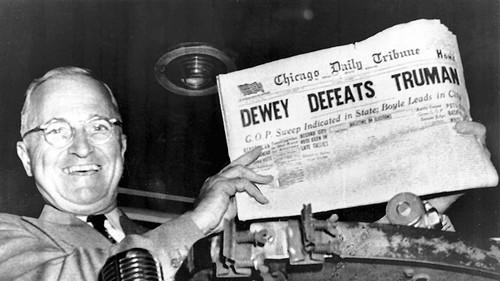|
Moderated by NW Okie! |
Volume 18 , Issue 102016Weekly eZine: (374 subscribers)Subscribe | Unsubscribe Using Desktop... |
Walking With Sweet Silly Sadie

My human told me that the year she was born was the year the Republicans had their "brokered convention" and it backfired on them with the false headlines in the "Chicago Tribune," November, 1948 with these headlines: "Dewey Defeats Truman." More about that in this weeks OkieLegacy, though.
Found on Newspapers.com
As reported in the Corsicana Semi-Weekly Light, Corsican, Texas, "Truman, Dewey Await Verdict of Voters." The Associated Press -- Harry S. Truman and Thomas Edmund Dewey came to the fork in the presidential trial on that November, 1948 date. The people would beckon one of them on.
The Democrat who holds the White House lease and the Republican who holds high hope of breaking it planned only the customary get out and vote appeals for tonight's windup to a long and exhausting campaign.
Depending on how those pleas are heeded, the weather, upwards of 50-million citizens would visit the polls. They would decide among other things, which party would control the next congress, and especially the senate.
For Dewey it was a second try, and the first time the Republican party had left its banner in the hands of a defeated candidate. The New York governor lost a popular vote decision to "The Champ" in 1944. But Franklin Delano Roosevelt's fourth term victory in the electoral college was a whopping 432 to 99.
For Truman it was an uphill race to win in his own right the mantle that fell upon him, as he put it, with "the whole weight of the moon and stars and all the planets" when Roosevelt died April 12, 1945. From the heights of popularity in the months that followed, Truman had to put down rebellion in his own party last summer. He was not completely successful.
But the president stoutly disputed the poll takers who showed Dewey far in the lead. Even without the votes he would lose in the South to States' Rights Democrat J. Strom Thurmond and elsewhere to Progressive party candidate Henry Wallace, Truman insisted in his campaign windup that he was going to win.
"The North, the South, the East and the West are falling in line," he declared at St. Louis Saturday night.
Dewey, too, was confident. He spoke of "The eve of victory" as he closed out his campaign in New York's Madison Square Garden.
Dewey then went to his Pawling, N.Y. farm to rest until he returned to New York later that day to vote and await the outcome.
Truman went on home to Independence, Missouri. He would cast his ballot and follow the returns there, but only until an early bedtime.
While the presidency was the big issue the next day, the senate battle commanded nearly as much attention. The Republicans, who smashed 14 years of Democratic rule of congress in the 1946 off-year elections, then held the upper hand in the senate by only a 51 to 45 vote margin.
Thirty-Two seats were at stake. And in 11 pivotal states the races were so close that politicians did not rule out the possibility of an unprecedented 48 to 48 tie.
Such a result would leave the deciding vote on party line issues up to the vice president, California Gov. Earl Warren if Dewey wins, or Kentucky's Senator Alben W. Berkley if Truman retained the White House.
In addition, 432 house seats, 32 governorships, hundreds of state and local offices and scores of referenda issues would be settled. Republican Maine elected a senator, governor and three house members in September. In many respects the presidential race had been one of sharp contrasts. Truman's St. Louis speech was his 271st in a "give 'em hell" campaign.
Dewey delivered exactly 101 fewer talks, most of them keyed to the theme of "Peace and Unity."
Woof! Woof! I have a dream! We need a "Future To Believe In .... And a Congress we can believe in!"
| View or Add Comments (0 Comments)
| Receive
updates ( subscribers) |
Unsubscribe
| © . Linda Mcgill Wagner - began © 1999 Contact Me | |
